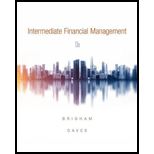
Intermediate Financial Management (MindTap Course List)
13th Edition
ISBN: 9781337395083
Author: Eugene F. Brigham, Phillip R. Daves
Publisher: Cengage Learning
expand_more
expand_more
format_list_bulleted
Concept explainers
Question
Chapter 2, Problem 8P
a)
Summary Introduction
To compute: The required
b)
Summary Introduction
To discuss: The effect of Rm and stock UT when
c)
Summary Introduction
To discuss: The effect of changes in stock UT.
Expert Solution & Answer
Want to see the full answer?
Check out a sample textbook solution
Students have asked these similar questions
The Short-Line Railroad is considering a $140,000 investment in either of two companies. The cash flows are as follows:
Year Electric Co. Water Works 1.................. $85,000 $30,0002.................. 25,000 25,0003.................. 30,000 85,0004–10 ............ 10,000 10,000a. Using the payback method, what will the decision be?
b. Using the Net Present Value method, which is the better project? The discount rate is 10%.
Skyline Corp. will invest $130,000 in a project that will not begin to produce returns until after the 3rd year. From the end of the 3rd year until the end of the 12th year (10 periods), the annual cash flow will be $34,000. If the cost of capital is 12 percent, should this project be undertaken?
Which of the following would hurt your credit score?
Closing a long-held credit card account.
Paying off student loan debt.
Getting married
Chapter 2 Solutions
Intermediate Financial Management (MindTap Course List)
Ch. 2 - Prob. 2QCh. 2 - Security A has an expected return of 7%, a...Ch. 2 - Prob. 4QCh. 2 - Prob. 5QCh. 2 - Your investment club has only two stocks in its...Ch. 2 - AA Corporations stock has a beta of 0.8. The...Ch. 2 - Suppose that the risk-free rate is 5% and that the...Ch. 2 - An analyst has modeled the stock of a company...Ch. 2 - Prob. 5PCh. 2 - The market and Stock J have the following...
Ch. 2 - Prob. 7PCh. 2 - Prob. 8PCh. 2 - Prob. 9PCh. 2 - Prob. 10PCh. 2 - Prob. 11PCh. 2 - Stock R has a beta of 1.5, Stock S has a beta of...Ch. 2 - Prob. 13PCh. 2 - You have observed the following returns over time:...Ch. 2 - Prob. 1MCCh. 2 - Prob. 2MCCh. 2 - Prob. 3MCCh. 2 - What is the stand-alone risk? Use the scenario...Ch. 2 - Prob. 5MCCh. 2 - Prob. 6MCCh. 2 - Prob. 7MCCh. 2 - Prob. 8MCCh. 2 - Prob. 9MCCh. 2 - Prob. 10MCCh. 2 - Prob. 11MCCh. 2 - Prob. 12MCCh. 2 - Prob. 13MCCh. 2 - Prob. 14MCCh. 2 - Prob. 15MCCh. 2 - Prob. 16MCCh. 2 - Prob. 17MCCh. 2 - Prob. 18MC
Knowledge Booster
Learn more about
Need a deep-dive on the concept behind this application? Look no further. Learn more about this topic, finance and related others by exploring similar questions and additional content below.Similar questions
- Which of the following would be expected to hold its value best during a time of inflation? A certificate of deposit. A corporate bond. A house.arrow_forwardWhat is a budget? A spending plan showing sources and uses of income. A limit on spending that cannot be exceeded. The amount of money that a credit card will let youarrow_forwardThe Pan American Bottling Co. is considering the purchase of a new machine that would increase the speed of bottling and save money. The net cost of this machine is $60,000. The annual cash flows have the following projections: Year 1 ........... 2 ........... 3 ........... 4 ........... 5 ........... Cash Flow $23,000 26,000 29,000 15,000 8,000 a. If the cost of capital is 13 percent, what is the net present value of selecting a new machine? I need to see the work. I can't use Excel to solve the problem. Excel doesn't help me solve Part a.arrow_forward
- Pat and Chris have identical interest-bearing bank accounts that pay them $15 interest per year. Pat leaves the $15 in the account each year, while Chris takes the $15 home to a jar and never spends any of it. After five years, who has more money? Pat. Chris. They both have the same amount. Don’t knowarrow_forwardAssume a firm has earnings before depreciation and taxes of $200,000 and no depreciation. It is in a 25 percent tax bracket. a. Compute its cash flow using the following format: Earnings before depreciation and taxes _____Depreciation _____Earnings before taxes _____Taxes @ 25% _____Earnings after taxes _____Depreciation _____Cash Flow _____ b. Compute the cash flow for the company if depreciation is $200,000. Earnings before depreciation and taxes _____Depreciation _____Earnings before taxes _____Taxes @ 25% _____Earnings after taxes _____Depreciation _____Cash Flow _____ c. How large a cash flow benefit did the depreciation provide?arrow_forwardAssume a $40,000 investment and the following cash flows for two alternatives. Year Investment X Investment Y 1 $6,000 $15,000 2 8,000 20,000 3 9,000 10,000 4 17,000 — 5 20,000 — Which of the alternatives would you select under the payback method?arrow_forward
- The Short-Line Railroad is considering a $140,000 investment in either of two companies. The cashflows are as follows:Year Electric Co. Water Works1.................. $85,000 $30,0002.................. 25,000 25,0003.................. 30,000 85,0004–10............ 10,000 10,000a. Using the payback method, what will the decision be?b. Using the Net Present Value method, which is the better project? The discount rate is 10%.arrow_forwardWhat is corporate finance explain its important?arrow_forwardWhat is corporate finance? can you explain more?arrow_forward
- General accounting problem.arrow_forwardWhat do you know about corporate finance? tell me about thisarrow_forwardWhich of the following is the primary function of insurance? Making risk disappear. Pooling and sharing risk among the insured. Making someone else pay for an accident or loss. Don’t know.arrow_forward
arrow_back_ios
SEE MORE QUESTIONS
arrow_forward_ios
Recommended textbooks for you
 Intermediate Financial Management (MindTap Course...FinanceISBN:9781337395083Author:Eugene F. Brigham, Phillip R. DavesPublisher:Cengage Learning
Intermediate Financial Management (MindTap Course...FinanceISBN:9781337395083Author:Eugene F. Brigham, Phillip R. DavesPublisher:Cengage Learning

Intermediate Financial Management (MindTap Course...
Finance
ISBN:9781337395083
Author:Eugene F. Brigham, Phillip R. Daves
Publisher:Cengage Learning
Efficient Market Hypothesis - EMH Explained Simply; Author: Learn to Invest - Investors Grow;https://www.youtube.com/watch?v=UTHvfI9awBk;License: Standard Youtube License